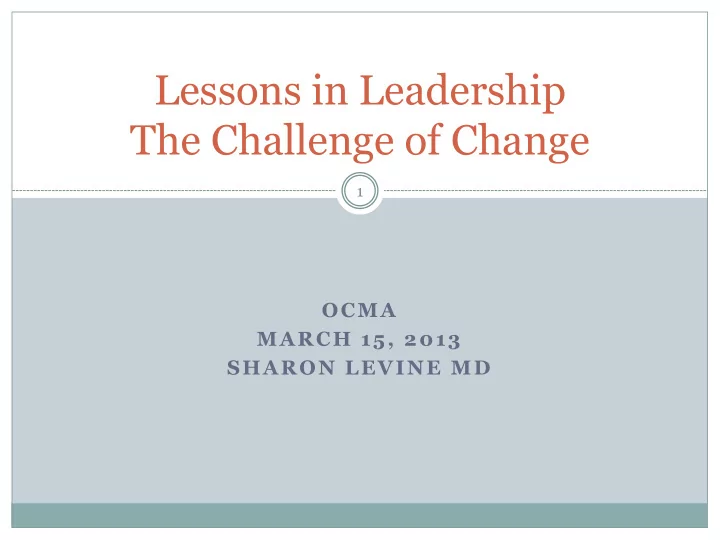

Lessons in Leadership The Challenge of Change 1 OCMA MARCH 15, 2013 SHARON LEVINE MD
Lessons in Leadership….. 2 Leadership matters – nothing important happens without it; and it matters most during times of rapid change and uncertainty Leadership is the ability, the privilege, and the responsibility to engage others in carrying out the purpose of an organization Leadership is most urgently needed in accomplishing a purpose through, and sometimes in spite of, intricately organized and complex systems
A journey in leadership – my story 3 In the beginning… Path to leadership – on-the-job- training Understanding the dual-relationship challenge in physicians-leading-physicians The need for formal training and mentoring Giving back, a hand-up, and critical mass
Lessons in Leadership 4 The “who”: there is no “ideal” leader – leaders come in all shapes and sizes, and genders Leaders are products of, and shaped by, the culture of the enterprise or organization in which they operate – even while they are trying to change the culture Success as a leader: you actually have followers (not just subordinates) & you actually get results
A (brief) word about culture 5 Leaders’ role as architect and steward of the culture of their organizations > build on its strengths, root out its dysfunction > understand it, in order to transform it Culture as the most powerful reinforcer of an organization’s norms, desired behaviors, and values Culture as the only reinforcer “when no one is watching”
Attributes of Successful and Effective Leaders 6 Stamina - physical endurance and emotional resilience Courage – in the moment, and over time Intellectual rigor, good judgment, disciplined thinking Commitment to fairness and transparency Optimism – “the Stockdale paradox” Infectious passion and enthusiasm for the work, and the mission
Attributes of Successful and Effective Leaders 7 Humility – “Level 5 leadership” (Jim Collins) – deep personal humility combined with intense professional will Emotional intelligence – capacity for empathy, confidence to be unafraid to appear vulnerable Confidence without arrogance Assertiveness without bullying And these are not “inborn” traits – they can be developed, trained, and taught when there is insight and willingness to grow as a leader
What Effective and Successful Leaders Do 8 Think long term Create context and give meaning to the work Translate complex ideas into clear, comprehensible stories Have influence on constituents way beyond their direct span of control Stewards of the vision and values of their enterprise, and caretakers of the interests and well being of the people and the purpose they serve Unlock the internal motivation of those they lead
What Effective and Successful Leaders Do 9 Commit to renewal and transformation – “status quo” never good enough Understand the (sometimes) symbolic role of leader Communicate effectively in deeds (90%) and in word (10%) and understand the power of their words to elevate/inspire, and to wound Create workable unity out of pluralism: “both/and” rather than “either/or” problem solvers
Understanding the Difference Between….. 10 Principled and inflexible Discipline and abuse of power Self confidence and arrogance Accountability and blame Assertiveness and bullying Encouraging input and paralyzed by indecision Disagreement and disloyalty Humility and reluctance to lead Followers and subordinates Tenacity and stubbornness
(Sometimes) Painful Lessons I’ve Learned 11 Responsibility for the welfare of a group is not about everyone liking you The day people stop bringing you problems or bad news is the day you have stopped leading Never cede power to “experts”, or fail to challenge directives damaging to those you lead Just because it doesn’t seem broken, doesn’t mean it couldn’t be improved In a knowledge based enterprise, people are the most valuable assets – create an environment where the best and the brightest want to work
12 Leadership is the art of accomplishing far more than the science of management says is possible Colin Powell
Recommend
More recommend